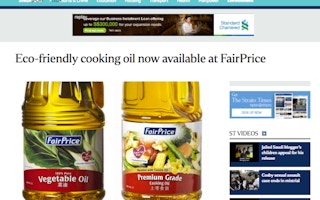Singapore’s largest supermarket group, NTUC Fairprice, has been called out for making inaccurate claims about the sustainability of the palm oil in two of its own-brand cooking oils.
To continue reading, subscribe to Eco‑Business.
There's something for everyone. We offer a range of subscription plans.
- Access our stories and receive our Insights Weekly newsletter with the free EB Member plan.
- Unlock unlimited access to our content and archive with EB Circle.
- Publish your content with EB Premium.
Kuala Lumpur-based Roundtable for Sustainable Palm Oil (RSPO), a certification scheme for the palm oil trade, sent a statement to the media on Monday that highlighted a story in local newspaper the Straits Times in which the supermarket claims that FairPrice Premium Cooking Oil and FairPrice Vegetable Oil had been RSPO certified.
The article in the broadsheet - published in October 2016 - carried the headline: “Eco-friendly cooking oil now available at Fairprice”.
RSPO has said that the claims made in the story are inaccurate as, although the suppliers of the oil have been certified and verified by the body, NTUC Fairprice itself is not RSPO-certified and is not an RSPO member.
NTUC Fairprice does not manufacture any oil, and relies on suppliers for its own-brand products.
RSPO-certified palm oil is grown on land that has not been burned to clear it, is not deemed to be of high conservation value, and has been obtained after getting proper permission from local communities.
Palm oil is the world’s most widely used vegetable oil, but the industry has been blamed for causing deforestation in Indonesia and Malaysia, and the haze fires that result from slash-and-burn forestry that choke much of Southeast Asia - including Singapore - every year.
RSPO has said that over the last nine months, the body has repeatedly informed NTUC Fairprice that it cannot endorse the claims made in the article.
“With the engagement process now appearing inconclusive, we can no longer avoid but to rebut these claims publicly while we remain open to assist NTUC Fairprice to take the necessary measurements to verify these claims, if they so wish,” RSPO’s global outreach and engagement director Stefano Savi told Eco-Business.
In a statement countering RSPO’s statement, NTUC Fairprice said that it had not flouted any RSPO membership rules and its products do not carry the RSPO label.
“FairPrice is aware that as a non-member of the Roundtable on Sustainable Palm Oil (RSPO), we are unable to utilise the RSPO label. We have clarified with RSPO that FairPrice Premium Cooking Oil and FairPrice Vegetable Oil do not carry the RSPO label and do not infringe any membership rules,” the company stated.
“These two products however, have been verified by their suppliers with the necessary certifications to be from RSPO sources. As a responsible retailer, FairPrice strives to ensure accurate and useful labelling of products to [sic] so that our stakeholders can be accurately informed about our product information.”
RSPO responded that not only is using the RSPO label unacceptable for non-members, but so is any RSPO-related claim.
To be a RSPO member costs around 2000 Euros (US$2,230) a year for each company. To get certified, the company’s supply chain would need to be verified and audited by RSPO.
Since the story was published nine months ago, no amendments have been made to it. The article highlighted that NTUC Fairprice has succeeded in selling sustainable palm oil products without raising their prices.
The story first emerged in response to a letter from Yi Han Tan, president of PM Haze, who in a letter published in the newspaper called on more companies to use sustainability sourced palm oil. NTUC Fairprice’s chief executive subsequently said in another open letter that the company now sells cooking oil from RSPO-certified sources.
Tan told Eco-Business that Fairprice should be given more time to get accreditation, and that the discrepancy was merely a technicality.
NTUC Fairprice found itself at the centre of debate concerning the haze in 2015, when it removed products made by Asia Pulp and Paper (APP) from its shelves after it emerged that many of the forest fires had occurred on APP concessions.
The move to stop selling the Indonesian paper and pulp giant products came after APP’s Green Label certification was removed.










